We were so appreciative that Governor Jim Hunt served as the evening’s keynote speaker. His transformative leadership and commitment to protecting the quality of life for all North Carolinians embodies the meaning of our Green Tie Awards.
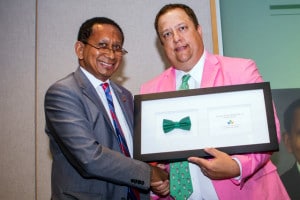
Since joining the NC General Assembly in 2007 to fill the seat of the late Senator Jeanne Hopkins Lucas, Senator Floyd McKissick has risen as a leader in the Chamber and as a strong voice on protecting North Carolina’s environment. Senator McKissick has prioritized sound environmental policy, defending policies that protect drinking water and promote clean energy investment. His scores over the years in NCLCV’s annual legislative Scorecard reflect his increased commitment, culminating in a perfect 100 in 2015, a year that was especially fraught with anti-environmental legislation in the NC Senate.
With leaders like Senator McKissick in our Chamber, we feel greater hope that sound clean air, water, and energy policies can remain and even expand in the coming sessions. We applaud Senator McKissick for his tenacity in putting the people of this great state first, no matter what.
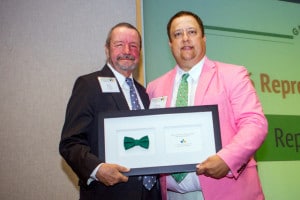
Representative Paul Luebke has been a stalwart for North Carolina’s air, land, and water since day one of his tenure at the NC General Assembly. His lifetime environment score of 99% is just one indicator of his willingness to champion a cleaner and greener North Carolina for all. Most recently, Rep. Luebke has been an outspoken opponent of the 2015 cap placed on state lightrail projects. He recognizes that the most important constituents aren’t those sitting in the Chambers of the NC General Assembly – it’s the people who he has been elected to represent.
Rep. Luebke has also been out front in holding Duke Energy accountable for covering the cost of cleanup of the utility’s highest-risk sites as well as removing the coal ash from unlined pits near drinking water sources. Year after year, Rep. Luebke demonstrates his willingness to protect the health and safety of North Carolina’s people and natural resources. It is an honor and privilege to award him as “Representative of the Year.”

Senator Josh Stein has made buffers his business, and none more-so than during the 2015 legislative session. In a sweeping collection of bills designed to undermine our rivers and coastal areas natural defenses, Senator Stein offered amendment after amendment to preserve critical riparian buffers that filter out sedimentation and other dangerous pollutants that put the health of our state waters (and all the creatures who live in them) in jeopardy.
But, his focus has been on more than just the integrity of our state waters. Senator Stein has taken the initiative to protect air quality monitors, demanded the implementation of the Jordan Lake Rules, and worked to find commonsense policies that protect the public’s health and safety from the risks posed by extractive energy practices, including fracking.
We hope Senator Stein is able to continue his service of defending what makes North Carolina such a special place to live, work, and play.

The decision of Representative Rick Glazier to resign from the NC General Assembly was both a win and loss for North Carolina. During his tenure as a legislator from Fayetteville, Representative Glazier consistently brought a pragmatic, thoughtful approach to stewarding our state’s natural resources and ensuring policies were put forward that maintained our quality of life. As the political landscape changed in Raleigh, Representative Glazier was able to rise about the partisan divide by providing a voice of reason. That didn’t mean he shied away from demanding environmental safeguards that had been intact for ten, twenty, or even thirty years remained untouched.
This isn’t the first time Glazier has been recognized at NCLCV’s annual Green Tie Awards. In 2011, he received recognition as the year’s “Defender of the Environment.” This honor came in large part due to his efforts on both the popular oil spill responsibility bill, to the less popular position of opposing measures to incentivize development without consideration for environmental destruction. It would have been easy to recognize Rep. Glazier year after year as his willingness to speak out for needed safeguards and long-term outlook never wavered in the face of a changing, more contentious political landscape.
Now, at the helm of the North Carolina Justice Center, Glazier continues to advocate for the best quality of life possible for all North Carolina citizens. His lifetime environmental voting score of 94% is a testament to his priorities, and we have no doubt he will continue to be a champion of our air, land, and water – and for our people – in this role and all others in the future.
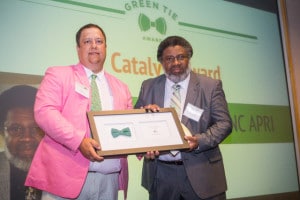
Melvin Montford is the Executive Director of the NC A. Philip Randolph Institute. Melvin understands that civic engagement is a year round process, and that many of the issues facing economically disadvantaged communities are related to environmental sustainability. From fracking to climate change, Melvin is at the forefront of bringing new advocates to the fight for clean energy. Melvin is an inspiring leader and a true environmental Catalyst.
His tremendous commitment to improving the lives of people in North Carolina is expansive. Through NC APRI, he is improving the quality of life for economically disadvantaged families by providing the necessary resources that improve their standard of living, foster self improvement, self empowerment, and self sufficiency. In recent years, his commitment also includes environmental sustainability and fighting climate change. Melvin has worked to elevate fracking and other environmental issues in recent elections, forged important new relationships between labor and environmental groups, and is at the forefront of bringing new advocates to the fight for clean energy in NC. Melvin is an inspiring leader and a true environmental Catalyst.
Melvin understands that civic engagement is a 365-day a year process. He also understands many of the issues facing the communities he’s working in are directly related to environmental issues. Healthcare costs are too high, especially in communities disproportionately impacted by air pollution. Jobs that support clean energy alternatives—windmill manufacturing jobs would be a boon to NC workers and solar is growing—can lessen the impact of lost dirty power jobs.
Long before most of us had even heard of the Koch Brothers, Melvin was fighting back against their influence in our elections and democracy. He has been pushing for the rights of workers for decades fighting and now is on the forefront of the climate and jobs battle ahead of us.
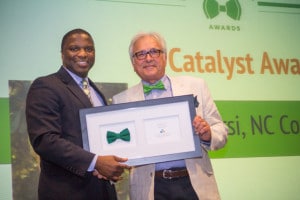
Sometimes, making impact requires us to adapt to the changing landscape of our issue. For Frank Tursi, adaptation is part of his career mantra. After spending more than 30 years as a reporter for newspapers including the Miami Herald and Winston-Salem Journal, he found a new home with the North Carolina Coastal Federation as the Cape Lookout coastkeeper. In this “hands on” position, he kept guard over the water and coastline, serving as a watchdog for pollution or developments that would threaten this critical area.
Continuing in this watch-dog vein, Tursi has returned to his reporter-roots as the editor of NCCF’s “Coastal Review Online”, a publication which is helping to keep coastal environmental issues in the mainstream dialogue for thought-leaders, elected officials, and statewide residents. The CRO is having a real, positive impact on making coastal policy relevant, whether it involves offshore energy, terminal groins, or beach renourishment. Through the CRO, Tursi has shown that effects of decision-making in Raleigh have real impacts and real consequences. Under his direction, the CRO staff have not been shy at holding people accountable for their actions. Additionally, under Frank’s leadership, Coastal Review Online won two dozen N.C. Press Association awards earlier this year for its coverage of coastal environmental issues in North Carolina.
During his newspaper career he led teams of reporters on complex projects, including an ambitious undertaking at the Winston-Salem Journal, a year-long project that detailed the history of the city’s major corporate benefactor, R.J. Reynolds Tobacco Co., and the lead role it played in the tobacco industry’s decades-long conspiracy to hide the health effect of cigarette smoking. The resulting 50-part series ran for two months in the Journal and won two national business reporting awards. It was later republished into his third book. Other reporting projects uncovered malfeasance in state government agencies and massive corporate pollution that poisoned the Pamlico River. Closer to home and nearer in time, as a Coastkeeper for the N.C. Coastal Federation, he worked with Cape Carteret officials on plans that required the then-proposed Lowes Home Improvement store to treat 10 times the stormwater that state rules then required. A year later, he worked with Cedar Point officials on similar stormwater plans for a proposed Walmart.
Running on a campaign of government transparency and responsibility, he was elected in 2015 to the Swansboro town council after holding positions as a member of the town’s planning board and various committees. An avid fisherman and model boat builder, he lives in Swansboro with his wife, Doris.
Mike Giles: “I can see Frank accepting this award and with his usual wit and sarcasm would offer some bits of wisdom we call Frankdom’s here at the federation. We all wish him well and as soon as he retires we can all throw away the “AP Style Guide” and use all the exclamation points in our writing he never would let us use. Congratulation old man! Here is looking at the finer things in life you enjoy, a nimble fishing rod and a good glass of Scotch. You deserve them.”
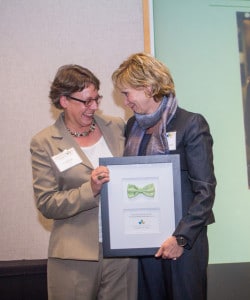
The 2016 Jane B. Sharp Lifetime Achievement Award is going to an extraordinary, compassionate, and unrelenting force in North Carolina’s environmental and political space: Nina Szlosberg-Landis. Although this is described as a lifetime achievement award, we know that Nina has barely scratched the surface on leaving a better North Carolina for all of us. Nina has been a tireless advocate for our natural resources and for our quality of life in all that she has done.
What prompted Nina to become such an advocate for our air, land, and water? In Nina’s own words “The environment is our life support system. Protecting it is essential to the health of pretty much everything we care about. If you care about education: it doesn’t matter if we have world class schools if children are in the hospital because of ozone induced asthma. If you care about business: world class companies live and die by the talent they are able to attract and retain. Talented people care about where they live. If given a choice between a community with ozone warnings, traffic congestion and no open space for jogging trails, biking, etc. and a city that is clean with amenities, they will choose the ‘green’ city. So, protecting the environment is important on many fronts.”
Nina’s record of conservation in the public sector is inspiring, to say the least: under Governor Easley, she was appointed to one our state’s most important administrative policy-making bodies: the Board of Transportation, where she oversaw NC DOT’s policies, budget, and programs through the environmental lens. Here, she brought her vast knowledge of “smart growth” policies as well as her unyielding commitment to protecting NC’s air, land, and water. She served in this capacity for 12 years – establishing the Board’s first Environment Planning and Policy Committee in the process. She also founded ‘The Hillsborough Street Partnership’ to revitalize the historic Hillsborough Street Corridor in Raleigh. And, in her free time, she served on the Triangle Transit Board of Authority.
Politically, Nina has not shied away from putting her values into action. In 2010, she served as co-chair of the NC Democratic Party on a coordinated campaign with then Charlotte Mayor (now U.S. Department of Transportation Secretary) Anthony Foxx. She also was a delegate to the DNC in both 2004 and 2012.
Of course, Nina has a special place in the heart of NCLCV, back when the organization was known as the Conservation Council of North Carolina. She joined the Board of Directors back in 1996 (yes, at the ripe age of 16, you are correct!) and helped establish NCLCV as the political arm of the environmental community; an organization willing to be in the election mix, to hold legislators accountable, and to go above and beyond to protect all North Carolina citizens.
As part of a letter of recommendation, Jane Preyer said this of Nina: “Every important environmental policy that has been achieved in North Carolina over the last two decades can be attributed in large part to Nina’s compelling voice, her work to secure financial support, and her determined advocacy.”

Sen. Paul Lowe
Sen. Jane Smith
Sen. Joyce Waddell
Rep. Gale Adcock
Rep. John Ager
Rep. Cecil Brockman
Rep. Ralph Johnson (posthumously)
Rep. Brad Salmon
Rep. Brian Turner
Rep. Shelly Willingham
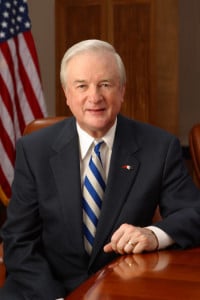
Governor Hunt served four historic terms as Governor of North Carolina (1977-1985, 1993-2001). He led North Carolina through an unprecedented period of educational improvement and economic growth.
Nationally recognized for leading his state through two decades of dramatic economic change and educational reform, Governor Hunt spearheaded the transformation of its economy from traditional industry to knowledge-driven industries – biotechnology, pharmaceuticals and IT.
Among his many successes in education, his early childhood education program, Smart Start, has been a model for the nation and has received the prestigious Innovations in American Government Award from the Ford Foundation and the John F. Kennedy School of Government at Harvard. In the last decade of his governorship the schools of North Carolina increased NAEP scores more than any other state in America. In the 1980s, Governor Hunt and the Carnegie Corporation of New York created the National Board for Professional Teaching Standards which he chaired for ten years.
Under Governor Hunt’s leadership, North Carolina consistently ranked at the top of the nation in economic growth, job creation and capital investment, and was nationally recognized for its business climate. Ever mindful that establishing the future economic prowess of his state depended on the “new economy,” he established the North Carolina Biotechnology Center, the Microelectronics Center of North Carolina, and the North Carolina School of Science and Mathematics. The state quickly became known as the most innovative state in the nation in biotechnology and IT.
Uniquely qualified, Governor Hunt promoted North Carolina as a business friendly destination. Having been instrumental in decisions to move companies to the state, he knows first-hand what moving a global company to North Carolina entails and the benefits it confers. In 2007 Governor Hunt became one of only two Governors in state history to be inducted into the North Carolina Business Hall of Fame. In 2006, Governor Hunt was named one of the ten most influential people in American education, along with Microsoft Chairman Bill Gates and former Presidents George Bush and Bill Clinton.
Governor Hunt is Chairman of the Board of Directors of the Hunt Institute for Educational Leadership and Policy in Chapel Hill and chaired the Institute for Emerging Issues at North Carolina State University in Raleigh for 30 years—both institutes which he founded in the University of North Carolina System.
Governor Hunt earned his BS in Education and MS in Economics from North Carolina State University and his JD from the University of North Carolina School of Law.
He and his wife, Carolyn, live on their beef cattle farm in Eastern North Carolina. The Hunts have four children, ten grandchildren and one great grandchild.

Marcia Angle & Mark Trustin
Cathi Seligmann*
Fred & Alice Stanback*


Linda & Rufus Edmisten
Jim Overton & Mary Mountcastle
Marion Sullivan
The Honorable Terry Van Duyn








Guenevere Abernathy & Michael Lemanski
Steve Smith*
Tom Taft
Dr. Amy Tiemann








Dick Bierly
Andrew & Jean Canada
David Jones
David & Avery Knight
Nina Szlosberg-Landis & Kel Landis
Al & Pam Swanstrom
The Honorable Brian Turner




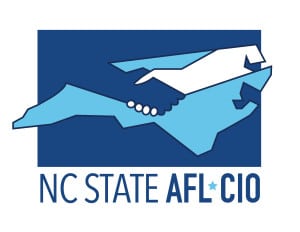

Lucy Allen
Cynthia Ball & Dave Aspnes
Mary Belk
Dan & Michelle Bruer
Courtney & Byinna Crowder
Jonathan Coby
Laura Edwards
Chris Heagarty
The Honorable Verla Insko
Gene Karpinski
John Manuel
Carol & Mac Montgomery
Bill & Bett Padgett
Alitha Palich
Ervin & Susan Portman
Mary Beth Powell & Bill Rote
Peter Raabe
David Smith
The Honorable Joyce Waddell
*Indicates the gift was made to the NC League of Conservation Voters Foundation
What We Do
Our Organizations
Mailing
P.O. Box 12671
Raleigh, NC 27605
